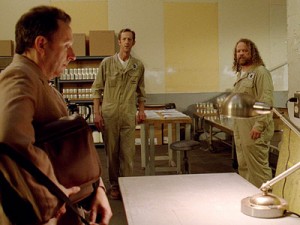 Earlier this week, Wrather, OTI’s fearless leader, asked me to write one final Overthinking Lost post to commemorate the release of the Lost DVD set. You may have heard that this DVD set includes a never-before-aired twelve-minute “epilogue” to the series. Have you seen it yet? If not, go take a look. I’ll wait while you find it on Goog…I mean, the official DVD that you purchased legally.
Earlier this week, Wrather, OTI’s fearless leader, asked me to write one final Overthinking Lost post to commemorate the release of the Lost DVD set. You may have heard that this DVD set includes a never-before-aired twelve-minute “epilogue” to the series. Have you seen it yet? If not, go take a look. I’ll wait while you find it on Goog…I mean, the official DVD that you purchased legally.
If you search through the Internet, you’ll find that two reactions to this epilogue exist.
Reaction Type 1: “Well, it was unnecessary, and it didn’t really tell me anything I couldn’t have guessed on my own, but it was nice that they made it.”
Reaction Type 2: “This is just another way for the creators of Lost to piss in our faces after wasting six years of my life! You suck, Lost!”
While my own reaction leans strongly towards Reaction Type 1, I’m much more interested in the second type of reaction. Unfortunately, there are no real statistics out there, but it seems like a huge contingent of Lost fanboys have now turned into virulent Lost-haters. It seems to be even worse than the BSG backlash; where most of the BSG fans now say, “The last seasons sucked, but the first two seasons were classic,” three months after the finale, many of the biggest Lost fans are saying, “It wasn’t worth it. Not any of it.” Last year, Lost was named one of the top 10 sci-fi shows ever on io9. This year, due to popular demand, it was taken off the list. The backlash hasn’t just begun, my friends. It’s accelerating.
Me? I don’t care very much either way. I’ll always look back on Lost with fond memories, even if I wasn’t a big fan of the last five minutes of the finale. When I wrote my last Overthinking Lost post, I said I had hoped that the show would influence television in a positive way for years to come. Now, I’m not so sure. It seems to me that the Lost backlash is teaching network executives lessons–lessons that may affect television for the worse.
BAD LESSONS LEARNED FROM LOST AND ITS FANS
Potential Lesson 1: Viewers can’t handle ambiguity. Not even a little.
Why this lesson seems right: Most of the fans who have turned on Lost have done so because they believe the whole show was some kind of con. Lindelof and Cuse directly or indirectly assured viewers that all questions would be answered, yet “The End” failed to tie up all the loose threads.
Proof that TV execs are taking this lesson to heart: Only one Lost-clone—The Event—is slated for this fall season, and NBC seems aware that it’s taking a real risk with this one. Will people really care to watch a show about an event that is so ambiguous even the characters in the show don’t know what it is?
Why this lesson might be wrong: Inception. Lost and Inception aren’t the same, of course, but they do have similar tones. Both are definitely sci-fi but hide that fact well enough that even non-sci-fi-fans allow themselves to enjoy them. They both seem to be about major questions (“What is the Island?” “Who is the real mark of the Inception?”), and both delight audiences with fancy literary tricks (flashbacks, flashsideways, dreams within dreams). But neither Lost nor Inception is primarily about those questions or those literary devices. At heart, they are both about a single character learning to deal with the ghosts of his past.
And both are quite ambiguous at times. Maybe Lost failed because it stayed ambiguous for too long. But if fanboys hate ambiguity so much, why are they calling Inception—which is just as ambiguous as Lost—“the greatest movie of all time”?
Potential Lesson 2: If you have to have mysteries, solve them as quickly as possible, or viewers will get impatient.
Why this lesson seems right: Again, see the fanboy comments.
Proof that TV execs are taking this lesson to heart: At the most recent NBC press tour, the producers of The Event basically begged viewers for their trust, saying “The show’s really designed to answer questions, to satisfy people… in the second episode we are very clearly answering the two largest open questions in the pilot.”
Why this lesson might be wrong: Three words: Twin Peaks, Flashforward. Twin Peaks, you’ll recall, was incredibly popular in its first season but then hemorrhaged viewers once its main mystery was solved. Flashforward tried to do what the makers of The Event are currently attempting—do a Lost but still answer all the viewers’ questions as quickly as possible—and it was promptly canceled.
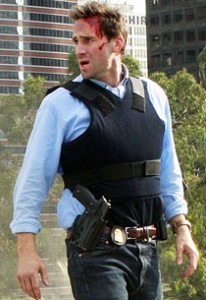
Joe is still confused by this turn of events.
Still, let’s give viewers and TV execs credit. They’ve learned some good lessons from Lost, too.
GOOD LESSONS LEARNED FROM LOST AND ITS FANS
Potential Lesson 3: Network shows can be as ambitious and critically-acclaimed as cable shows.
Why this lesson seems right: Of course, Lost wasn’t the only network show that helped critics learn this lesson, but it was definitely one of the most popular. Going up against two highly-acclaimed HBO shows (Deadwood and Six Feet Under), Lost- won an Emmy for Outstanding Drama in 2005. It has since earned a high place on many TV critics’ lists of best television shows of the 2000s.
Proof that TV execs are taking this lesson to heart: Just look at the network pilots made over the past six years. Sure, most of them weren’t any good, but you’ve got to admit that, on average, these series were more ambitious than the pilots we were seeing in the pre-Lost years. (At the very least, the post-Lost shows were more expensive to make, so that’s… something.)
Why this lesson might be wrong: Cookie-cutter procedurals and reality shows still top the ratings for the major networks. Most of the new pilots this season are still cop, lawyer, and doctor shows.
OTHER LESSONS EXECS SHOULD LEARN FROM LOST
Lesson 4: Today’s audiences will watch science-fiction.
Lesson 4a: …but only if you don’t tell them it’s science-fiction. If it gets too science-fictiony too soon, you get Flashforward or Fringe, neither of which worked ratings-wise.
Lesson 4b: Today’s audiences will watch cross-genre shows…but only if the main concept of the show is very strong. It seems to me that the main reason Lost was a success but Flashforward was a failure was that Lost’s high concept was stronger. “A bunch of people crash land on a deserted island” is much easier to understand than “the whole world blacks out for a few minutes and sees their futures but maybe they aren’t actually their futures and what if the future can change and also some evil group may be behind the blackouts.”
Lesson 5: It doesn’t matter how good the concept is if the writing and acting aren’t strong. Although I really liked the concept for Persons Unknown (I am a fan of The Prisoner, after all), I could not sit through more than one episode, because the dialogue was tin-eared, the character motivations unrealistic, and the acting wooden. The acting may be the most important thing. If you get actors like Terry O’Quinn and Michael Emerson on board, it might not matter how ridiculous the plots or dialogue are. We’ll believe them.
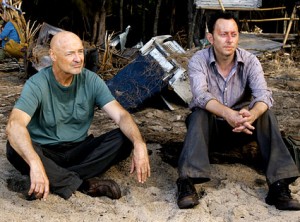
Who here wouldn't watch a show about Locke and Ben sitting around on the beach, talking about nothing?
Lesson 6: When audiences decide they don’t care about a love triangle, drop it. Once Lost stopped harping on Kate’s love life and started focusing on her relationship to Aaron and Claire, her character became a million times better.
Lesson 7: It’s pretty cool to watch a show where literally anyone can die at almost any time. It keeps audiences on their toes.
Lesson 8: Matthew Fox is underrated. The fact that he was able to make Jack likable again in the last season was nothing short of a miracle. Give this man more work!
Lesson 9: Give episodes room to breathe. Every Lost-clone I’ve tried to watch so far has been non-stop action and question-asking. If you want to make a show that replicates Lost’s success, watch the pilot again. Notice how slow it is at points, especially at the beginning. Notice that characters are given the room to develop. People may remember Lost for the explosions and plot twists and smoke monster, but my favorite moments from the show will always be the quiet moments: Sun finding freedom on the beach; Locke standing for the first time on the Island; Sawyer telling Jack about how he met his dad; Locke teaching Walt how to play backgammon; Penny and Desmond on the phone during “The Constant”…
Lesson 10: Michael Giacchino should score everything.
[What lessons do you think TV producers should learn from Lost? Sound off in the comments!]
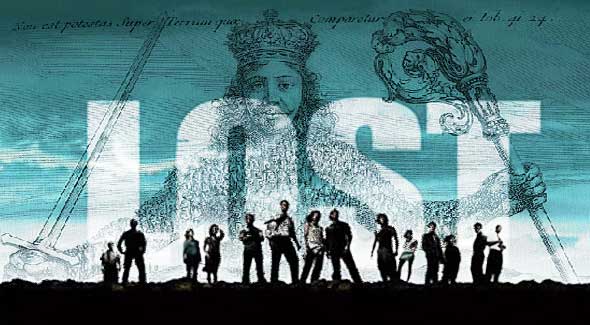
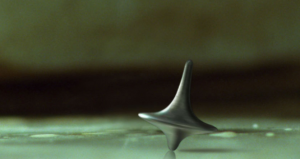
Lost, um, “lost” me long before the finale. I think what did me in was after Season 3 when they started having short seasons with absurdly long hiatuses. This story didn’t need to be drawn out for 6 damn years. During those later seasons, I’d forget many details, characters, and plots by the time the next seasons would start and would be frustrated and confused at the beginning of each season (even with the unhelpful recaps) – and this is a fan of the show speaking! I tried desperately to be interested in these characters, because I genuinely liked them, but I was ready to give up many times. I the end I did finish the show, because my masochistic curiosity for how it would all turn out held me in like an abused spouse.
Each time it was Lost week I became less and less excited about it and it felt more and more like a chore. We didn’t have the Lost parties we used to have in the earlier seasons anymore. This lack of enthusiasm became worse when they took characters I liked (like Sun) and gave them the hints of an interesting storyline just to go pull the rug out from under it.
Get to the point, Kimbo. Well, I’m not sure the internet ire can be entirely attributed to the finale. I think the show had a few missteps long before that and a less than forthright finale was the straw that broke some Lost geeks’ internet composure. Some people gave up, but some people stuck with it and perhaps felt that their loyalty went unrewarded. Things might have turned out differently if the producers hadn’t publicly made what turned out to be false promises. They gave the still loyal audience false expectations so when the show didn’t live up to those expectations, what did they think was going to happen?
It would be a shame if network execs/producers attributed the internet backlash to the ambiguous finale when I think it might be more related to the overall handling of the show and its characters. I look forward to more shows like Lost in the future that can hopefully learn from Lost’s mistakes.
I think your understanding of the Lost backlash is off base. The root of the fan backlash in nearly every instance I’ve observed it are tied to Lindelof and Cuse making promises that they either couldn’t or had no intention of keeping. It is a bait and switch backlash. That is where an inception parallel breaks down. But it strengthens the BSG comparison, because Ron D. Moore wasn’t out there making false promises. So he was forgiven for a let down of a finale. It had nothing to do with ambiguity.
If there is a lesson that they should be learning it is that they shouldn’t allow showrunners to make promises for the future beyond what has been written.
Also, I disagree with your understanding of the failures of Flashfoward and Twin Peaks. Flashfoward was reworked several times because the writing was abysmal. Add in a cast without any charisma and you have a sure fire failure on your hands. Twin Peaks angered people because it didn’t answer questions not because it did.
Good point about the Lindelof/Cuse promises. I guess that stuff never bothered me, because I basically ignored them the whole time. So I guess that’s another good lesson: TV writers, write your best stuff, and then be quiet!
I may be wrong about the whole Twin Peaks phenomenon, seeing as I didn’t watch it, but I really thought the consensus was that everyone stopped watching once Laura Palmer’s killer was revealed.
That’s the conventional wisdom about Twin Peaks, but having watched the entire series recently (I was too young to see it when it aired) I think it’s somewhat mistaken. Viewership did seem to decline around the time Laura’s murderer was revealed, but I think it was more the nature of the answer, and some major related changes around the same time, that doomed it. Namely, the identity of the killer was a cop-out, being purely supernatural, in a show that had previously worn its supernaturalism extremely lightly. Thereafter the show become almost wholly domininated by supernatural storylines. And even those that were not supernatural (e.g., James’s dalliance with an older married woman, after so much time and effort had been invested in his relationship with a young Lara Flynn Boyle) became increasing soap-opera-like, with wild sudden out-of-character shifts in behavior. Although TP is usually presented as proof that a show can’t answer a central question without loosing its audience, I think these other factors were more responsible, and that there are enough counter-examples (Burn Notice, I’m told, though I’ve never seen it) that have successfully segued from one central question to another.
The one way in which FlashForward didn’t answer questions quickly enough was in the way that it’s never coming back. I loved every episode of the show, and consider it well-written and well-acted in the context of its drama, the weak link only really being Joseph Fiennes, and still did his job as a an FBI agent fine.
Ditto, totally ditto.
I’m a disillusioned former LOST fan, and I never listened to a single podcast. The fundamental problem was that hugely important plot points were completely abandoned. Why did Ben lie to Locke about having pushed the button? Why did The Others take over every other Dharma station except the one which might, you know, blow up the whole island if a button doesn’t get pushed? How was Walt special? The list goes on.
And they kept doing it all the way through the final season. With what did Sayid become infected? Since at the very end he died heroically, was he never infected at all?
I had similar frustrations about the show. Jack and co. were super-curious sometimes, and other times, they’d just say ‘ok, others, I’ll do what i need to do to advance the plot.’ They didn’t seem to ask the critical questions that they would be asking in that situation. Aside from Hurley, most of thse people really never felt real to me.
Also, it annoyed the life out of me having a mystic named ‘John Locke’
By the way, I hope I didn’t make it sound like I begrudge anyone who is feeling annoyed at Lost or its writers. Everyone is, of course, allowed to have his or her own opinion about a TV show. And although I don’t care enough about Lost to be as furious as some of the commenters I’ve seen on the Internet, I understand where the anger is coming from. My only worry is that the backlash might influence the decisions of producers and writers and that we’ll be seeing far less risk-taking on network TV for at least the next few years as a result.
Got it? Got it!
i got it! and i actually agree with all of your points. and frankly i would be even harsher on the angry fanboys, being upset by a finale of a show one has watched for 6 years seems a bit retarded to me.
(i stopped after finale of season 3 when it began to annoy me more than entertain me – and yet i still consider lost one of the best tv shows ever made and naively hope that the executives will take more of the good lessons)
In Lost’s defense, season three was the worst. But I’m with you on wanting to be harsher on the fanboys.
Network TV is doomed anyway.
Network TV isn’t exactly dying. It is becoming increasingly marginalized. Targeting demographics of casual TV watches while those of us who Tivo, and never miss an episode are being picked up by cable.
This upcoming season I will watch 3 times as much FX as I will watch any of the nextworks. FX, AMC, HBO, and Showtime combined will be 5 times as much as I plan on watching NBC, ABC, CBS, Fox, or the CW.
Meanwhile my mother, a casual viewer will watch networks almost entirely.
I really don’t get what ambiguity problems there was with Lost. A lot of things were never answered, I will agree, but you either have to work it out in your head (by filling in the blanks or making it up) or you can just accept you will never know.
Did we all really expect in the finale that someone would take the time to explain Walt’s “powers”, why kids we’re being abducted, what the big hurley bird was etc? I thought the finale of Lost was incredibly moving and told me all I needed to know. The rest I will leave to my imagination and come up with something probably far better than Cuse/Lindelof could have.
I don’t mean to undermine your article. I agree with the tone of it, that Lost may have caused networks to shy away from similarly ambitious and risky narratives. BUT.
One, you refer to Fringe in the past tense. To my knowledge, the show is coming back for a third season for sure. Ratings may be tepid, but not terrible.
Two, Locke’s “Walkabout” scene revealing him to be a formally wheelchair bound man was anything but quiet. It might have been one of Giacchino’s most swelling and present score in the whole series if I remember right.
I’m on the “it’s about the journey, not the destination” side of Lost faithful.
The finish of Lost never bothered me because I thought the Island was super-mystical place (Total Redemption Island) from the get-go. They were seeing dead people and I took the writers at their word that it wasn’t heaven or hell. People who wanted a real-world explanation for why Jack was seeing his dead father on an Island that had a monster made of smoke were always going to be disappointed.
The viewers who were unsatisfied with ending were the Dharma Initiative. They came to an island where weird stuff happened and never found an explanation to answer why crazy things happened.
I saw the extra footage and honestly, it made me want more Lost. Ben was creepy-awesome as usual, and it even had Walt, hinting that he was special but his importance was not tied into Jacks quest, but one all his own (you tellin me you wouldnt watch Lost- Walts Tale?). It seems to me that people think the writers of the show were writing episodes week to week during the actual airing of the season. You (not specifically anyone, but the royal you) do realize that they had the ending from at least the midway point of the 5th season if not much, much earlier, right? The whole a-bomb fiasco that led to the creation of the alternate timeline wasnt being written as it went, it was plotted out. You can see this when Juliette starts babbling about coffee right before she died. She repeats the same thing when she merges with her alt-world self after dieing…pretty much the same way jack merged at the very end. Sure, it might not be how you would have written it, but its the artists vision that matters not the audiences.
It was pretty lame to lie about how much your going to answer, but really, if they answered everything people would whine about the answer just as much. I try to look at it like- ignore the stupid alt-world stuff, and just look at the island stuff as your ending. Jack beats locke, but dies doing so. Hurley stays on the island and a redeemed Ben stays to help. Sawyer Kate Claire Miles and Lupidus survive. Because Lupidus is a badass. Thats a good enough ending for me.
Although in regards to the *actual* topic of this post- I think your right, execs of any kind are by nature cowardly and probably will pass up on 1000 great shows now because they dont want to take the chance of pissing off fans after the show is over (despite how much advertising money they obviously made during the entire run of the show)
Good television can work on two levels, no matter the genre. The challenge for writers and producers is to provide a small conflict which can be resolved in one episodes, but simultaneous be part of a puzzle that keeps viewers tuned in each week.
Lost partially accomplished the second part because the audience wanted to find out more about the island, but rarely achieved inner-episode satisfaction. In order to garner higher ratings, executives need to understand that most viewers (not the overthinkingit crowd) have short attention spans and need a payoff at the conclusion of each show.
Failure of lost re: Barthes’ HER code, and what happens when you abandon the primary method of moving the narrative along in a finale. Overthinkers…assemble!
Will we see all six seasons of Lost in the bargain bin next to Life on Mars in a few years?
In direct response to the epilogue, I think the dudes Ben is with in the picture up ^thar^ are audience stand-ins. Think of it like this: They sit and friggin’ watch something that answers some specific questions they had- but then leaves them with a bunch more. Walt stuff aside, those workers are us. Watching them was a rather meta experience for me, and I totally felt for them because of it. And actually, it made me enjoy the epilogue marvelous much.
That being said, I’m not one of those angry fans that was expecting answers. I ignored what the writers said about answering questions and accepted that the show’s modus operandi was leaving stuff unanswered, so neither the epilogue, nor the finale pissed me off.
Unfortunately, I do think you’re right, Mlawski, in that the fanboy anger will probably harm television. Which is sad, because elitist as this sounds, it kind of proves that fans as a collective may demand “smarter” television, but freak out when it’s given to them. Or maybe it doesn’t, because perhaps it’s just the fringe fans making a fuss, a small but much more vocal minority than the more sensible but quieter majority. I equate it with fringe political groups like the Tea Party or GreenPeace- they get the attention because they draw it the most through their radical, eye- and ear-catching vociferations and whatnot, and their beliefs, opinions, and actions become the stereotype. Because I think the comments on this page and the one about the finale prove a lot of fans were disappointed, yes, but don’t necessarily hate the show with a fiery, seething passion now. But, alas, I don’t think the television execs will pay attention to fans the likes of which have been commenting here because said fans aren’t kuh-ray-zay.
I think Lost made the same mistake that many other conspiracy shows have in the past. The simple truth of the matter is that any show that relies on mystery will always, I repeat always disappoint when that conspiracy is revealed because once it is, the mystery that drove the plot forwards, that drove the narrative is effectively gutted.
Not only that, but people will always speculate as to what’s going on, regardless of whether they are right or wrong, this speculation is at the heart of the discourse about any TV show. When it’s gone, the viewers cant discuss what’s potentially going on, but can only focus on the worth of what was revealed.
I loved Lost, loved the TV show and characters, the performance and the way it was put together. But I hated not only the ending but also the way it contradicted itself on so many key plot points the same way BSG did.
However, my hatred of the ending will never influence the enjoyment I get out of watching the performances and visual style of the show. A lot off effort went into the production, to me it had perhaps an almost cinematic overtones and you’re right with the lessons being learnt will only serve to dumb down and detract from future television production.
I think the overall lesson is that television isn’t made for thinking, it’s a intellectual reduction exercise that is geared towards selling stuff and keeping bums glued to the box. Lost had its little hidden messages and it became obvious to those that paid attention that there was never any intention for revelations that explained everything to take place, going against the grain of the audiences desires. People need closure, its dichotomous because by providing that, the show lessens its own power.
I remember Push Nevada emerging with this modus operandi and it also failing. However, Push like Lost was a brilliantly made show that is and always will be enjoyable.
The analysis of Twin Peaks is interesting but not a good parallel. It might be more instructive to look at how Japanese audiences react to the finale of long complicated anime series. In variably its a disappointing scenario where the male protaganist is about to head of the apocalypse and then doesn’t and so the apocalypse starts and so he protaganist jumps into the belly of the beast, there is apotheosis and order is restored to a world that nevertheless slightly changed while the protaganist has transcended.
Lost follows this formula exactly, and all that implies.
Lesson #11: Be sure to include J. Michael Straczynski on your writing staff if you wish to attempt a multi-year long story arch.
Thomas, it’s true that it’s simply human that a mystery, once revealed, will always disappoint. I don’t think it’s fair to say LOST hinged on the mystery, though, as I always viewed the Island as a mythic metaphor that provided the structure for some really good storytelling. The mystery is a lot of fun on one level, sure, but there’s no way I would have watched and enjoyed six seasons of LOST without excellent writing, directing, acting and scoring. I do think it was a mistake to actually show the source of the Island’s power, however, for the reasons you mentioned.
As for Twin Peaks, I was only 11 when it was on, and only saw it in passing, but I did watch it all the way through last year and it was quite clear to me that ABC learned its lesson from Twin Peaks’ failure, and did not make the same mistakes with LOST.
ABC essentially destroyed Twin Peaks. Lynch & Frost never intended to reveal the identity of Laura Palmer’s killer; it was merely a MacGuffin to get us into this really interesting town and tell these really interesting stories. ABC took the typical network line and said “no, no, you can’t do that, the viewers need to know” despite the growing fanbase which suggested that the writers knew what they were doing. When they finally did solve the murder, the storyline was hackneyed and silly because it didn’t come from the same creative well from which the initial concept sprung – it was done only to satisfy a network executive. Lynch has said in interviews that he regrets doing it and he wishes the network would have listened to him, and that he tried his best to save the show after the revelation sucked the life out of it, but it didn’t work.
Had ABC respected the artists and trusted their vision, the second season of Twin Peaks probably wouldn’t have been the disaster it was. I think they made up for this with LOST, by giving the writers a lot more freedom (most notably by allowing them to set an end date), and I applaud them for doing something most of the money people in the arts are loathe to do: they took a risk and trusted the people involved in the highly intuitive and subjective business of making the art itself. It may have irked some people on the Internet, but in the end I think it created a show that it much more aesthetically solid than what Twin Peaks ultimately became.
Apropos of your caption, my new fanboy’s dream is to see Michael Emerson and Terry O’Quinn in a production of Waiting for Godot.